| Listing 1 - 10 of 18 | << page >> |
Sort by
|
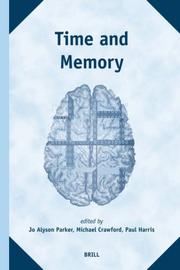
ISBN: 1281400785 9786611400781 904741117X 9789047411178 9781281400789 9004154272 9789004154278 6611400788 Year: 2006 Publisher: Leiden ; Boston : Brill,
Abstract | Keywords | Export | Availability | Bookmark
 Loading...
Loading...Choose an application
- Reference Manager
- EndNote
- RefWorks (Direct export to RefWorks)
The nature of time has haunted humankind through the ages. Some conception of time has always entered into our ideas about mortality and immortality, and permanence and change, so that concepts of time are of fundamental importance in the study of religion, philosophy, literature, history, and mythology. On one aspect or another, the study of time cuts across all disciplines. The International Society for the Study of Time has as its goal the interdisciplinary and comparative study of time. This volume presents selected essays from the 12th triennial conference of the International Society for the Study of Time at Clare College, Cambridge. The essays are clustered around themes that pertain to the constructive and destructive nature of memory in representations and manipulations of time. The volume is divided into three sections Inscribing and Forgetting, Inventing, and Commemoration wherein the authors grapple with the nature of memory as a medium that reflects the passage of time.
Time --- Memory --- Memory. --- Retention (Psychology) --- Intellect --- Psychology --- Thought and thinking --- Comprehension --- Executive functions (Neuropsychology) --- Mnemonics --- Perseveration (Psychology) --- Reproduction (Psychology)

ISBN: 0198529678 9780198529675 Year: 2006 Publisher: Oxford Oxford University Press
Abstract | Keywords | Export | Availability | Bookmark
 Loading...
Loading...Choose an application
- Reference Manager
- EndNote
- RefWorks (Direct export to RefWorks)
Memory. --- Memory --- Cognitie. --- Coherentie (algemeen) --- Geheugen. --- Neurowetenschappen. --- Brain --- physiology. --- Coherentie (algemeen). --- Retention (Psychology) --- Intellect --- Psychology --- Thought and thinking --- Comprehension --- Executive functions (Neuropsychology) --- Mnemonics --- Perseveration (Psychology) --- Reproduction (Psychology) --- Physiology.
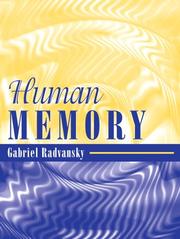
ISBN: 9780205457601 0205457606 Year: 2006 Publisher: Boston, Mass. Pearson
Abstract | Keywords | Export | Availability | Bookmark
 Loading...
Loading...Choose an application
- Reference Manager
- EndNote
- RefWorks (Direct export to RefWorks)
Cognitive psychology --- Memory --- #KVHB:Geheugen --- Retention (Psychology) --- Intellect --- Psychology --- Thought and thinking --- Comprehension --- Executive functions (Neuropsychology) --- Mnemonics --- Perseveration (Psychology) --- Reproduction (Psychology)
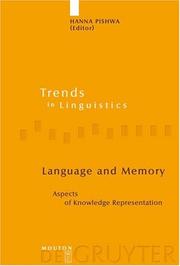
ISBN: 3110189771 9783110189773 3110895080 Year: 2006 Volume: 173 Publisher: Berlin: Mouton de Gruyter,
Abstract | Keywords | Export | Availability | Bookmark
 Loading...
Loading...Choose an application
- Reference Manager
- EndNote
- RefWorks (Direct export to RefWorks)
This volume presents an entirely new, expanded cognitive view of language by examining linguistic structure and its use in communication from the point of view of memory, thus providing a novel way of analysing language. The fourteen chapters, authored by linguists and psychologists, show the need for such an approach and illustrate that the properties of numerous linguistic structures reflect those of memory in various ways. Many different methodologies are presented because of the interdisciplinary nature of the volume, without reducing the comprehensibility and comparability of the contributions. Core linguistic areas are discussed in the contributions embracing syntax, semantics, pragmatics, and discourse analysis; psychological aspects are restricted to memory systems and their properties. The introduction provides a concise overview of memory, and then three sections examine linguistic phenomena from various angles relating them to memory. In the first section, the contributions emphasize the issue of syntagmatic vs. paradigmatic organization in various linguistic phenomena with a focus on syntax and their locus in memory. The contributions in the second part investigate structures with non-fixed functions showing that they tend to be connected to a certain submemory sharing their features such as subjectivity and evaluation. The concern of the last section is discourse comprising coherence, evidentiality, politeness, and persuasion. The book should be stimulating for researchers and students of linguistic core areas as well as those occupied with developmental aspects and theoretical aspects of language. It also provides new insights into methods of analysis both in linguistics and in cognitive psychology. The individual chapters are comprehensible to linguists who have no background in psychology and to psychologists who have to background in linguistics.
Psycholinguistics --- Psycholinguistics. --- Memory. --- Psycholinguistique --- Mémoire --- Memory --- Mémoire --- Language, Psychology of --- Language and languages --- Psychology of language --- Speech --- Linguistics --- Psychology --- Thought and thinking --- Retention (Psychology) --- Intellect --- Comprehension --- Executive functions (Neuropsychology) --- Mnemonics --- Perseveration (Psychology) --- Reproduction (Psychology) --- Psychological aspects --- Cognitive linguistics. --- psycholinguistics.
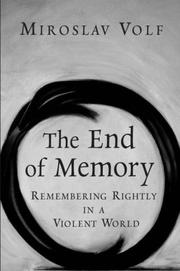
ISBN: 9780802829894 0802829899 Year: 2006 Publisher: Grand Rapids, Mich. Eerdmans
Abstract | Keywords | Export | Availability | Bookmark
 Loading...
Loading...Choose an application
- Reference Manager
- EndNote
- RefWorks (Direct export to RefWorks)
Can one forget atrocities? Should one forgive abusers? Ought we not hope for the final reconciliation of all the wronged and all wrongdoers alike, even if it means spending eternity with perpetrators of evil? We live in an age when it is generally accepted that past wrongs--genocides, terrorist attacks, bald personal injustices--should be constantly remembered. But Miroslav Volf here proposes the radical idea that letting go of such memories--after a certain point and under certain conditions--may actually be the appropriate course of action. While agreeing with the claim that to remember a wrongdoing is to struggle against it, Volf notes that there are too many ways to remember wrongly, perpetuating the evil committed rather than guarding against it. In this way, "the just sword of memory often severs the very good it seeks to defend." He argues that remembering rightly has implications not only for the individual but also for the wrongdoer and for the larger community. Volf's personal stories of persecution offer a compelling backdrop for his search for theological resources to make memories a wellspring of healing rather than a source of deepening pain and animosity. Controversial, thoughtful, and incisively reasoned, The End of Memory begins a conversation hard to ignore. - Publisher.
Christian moral theology --- Memory --- Reconciliation --- 241.4 --- Religious aspects --- Christianity. --- Theologische ethiek: schuld; zonde; bekering; verzoening --- Verzoening. --- 241.4 Theologische ethiek: schuld; zonde; bekering; verzoening --- Peace making --- Peacemaking --- Reconciliatory behavior --- Quarreling --- Retention (Psychology) --- Intellect --- Psychology --- Thought and thinking --- Comprehension --- Executive functions (Neuropsychology) --- Mnemonics --- Perseveration (Psychology) --- Reproduction (Psychology) --- Religious aspects&delete& --- Christianity
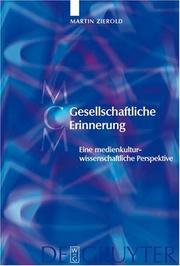
ISBN: 9783110189834 3110189836 9786612195754 1282195751 3110202107 9783110202106 3110576805 Year: 2006 Volume: 5 Publisher: Berlin : De Gruyter,
Abstract | Keywords | Export | Availability | Bookmark
 Loading...
Loading...Choose an application
- Reference Manager
- EndNote
- RefWorks (Direct export to RefWorks)
Das Themenfeld "Kulturelles Gedächtnis" bzw. "Erinnerungskulturen" boomt in den Kulturwissenschaften. Obwohl der enge Zusammenhang zwischen Medien und gesellschaftlichen Erinnerungsprozessen stets betont wird, bleiben bisherige Konzepte hier oft vage, und insbesondere die Forschung zu gesellschaftlicher Erinnerung in Zeiten moderner Medientechnologien steht noch am Anfang. Der Band setzt an dieser Diagnose an und rückt den Zusammenhang von Medien, Kultur und gesellschaftlicher Erinnerung in der Gegenwart in den Mittelpunkt eines neuen Theorieangebots. Aufbauend auf einer Systematisierung und Kritik bisheriger Entwürfe wird eine medienkulturwissenschaftliche Terminologie und Modellierung von Gedächtnis und Erinnerung vorgeschlagen, die an den bisherigen Diskurs anschließt und zugleich durch eine Integration kommunikationswissenschaftlicher Überlegungen neue Perspektiven eröffnet.
Mass media --- Memory --- Social perception --- Psychological aspects. --- Social aspects. --- Sociological aspects. --- Philosophy. --- Retention (Psychology) --- Sociology of memory --- Cognition, Social --- Interpersonal perception --- Social cognition --- Intellect --- Psychology --- Thought and thinking --- Comprehension --- Executive functions (Neuropsychology) --- Mnemonics --- Perseveration (Psychology) --- Reproduction (Psychology) --- Sociology --- Interpersonal relations --- Perception --- Social cognitive theory --- Memory. --- cultural studies. --- mass media.
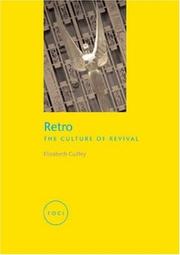
ISBN: 9781861892904 Year: 2006 Publisher: Londen : Reaktion Books,
Abstract | Keywords | Export | Availability | Bookmark
 Loading...
Loading...Choose an application
- Reference Manager
- EndNote
- RefWorks (Direct export to RefWorks)
"Drawing upon a wealth of original research and anecdotal material, Guffey unearths the roots of the term retro and chronicles its manifestations in culture and art throughout the last century. From the comeback of Art nouveau nearly fifty years after its original decline to the infusion of Art Deco into the kitsch glamour of Pop art, the idea of retro has often meant a re-emergence of styles and fashions that evoke familiar touchstones of memory from the not-so-distant past, such as the drug-induced surrealism of psychedelic art and the political expressions of 1970s afros. Reinforcing such tends in art, design, fashion and music, advertisers and the media have seized upon the power of cultural nostalgia to promote a surprising range of products."--Jacket.
retro --- trend --- Popular culture --- Memory --- Nostalgia. --- Clothing and dress --- Fashion --- Design --- Retromarketing. --- History. --- Social aspects. --- Retention (Psychology) --- Intellect --- Psychology --- Thought and thinking --- Comprehension --- Executive functions (Neuropsychology) --- Mnemonics --- Perseveration (Psychology) --- Reproduction (Psychology) --- Retro marketing --- Marketing --- Creation (Literary, artistic, etc.) --- Society and clothing --- Nostalgia --- Retromarketing --- History --- Social aspects
Book
ISBN: 9788870885057 8870885054 Year: 2006 Volume: 5 Publisher: Napoli: Bibliopolis,
Abstract | Keywords | Export | Availability | Bookmark
 Loading...
Loading...Choose an application
- Reference Manager
- EndNote
- RefWorks (Direct export to RefWorks)
Mémoire (philosophie) --- Individu (métaphysique) --- Platon, --- Aristote, --- Hegel, Georg Wilhelm Friedrich , --- Husserl, Edmund, --- Critique et interprétation --- Hegel, Georg Wilhelm Friedrich, --- Memory --- Retention (Psychology) --- Intellect --- Psychology --- Thought and thinking --- Comprehension --- Executive functions (Neuropsychology) --- Mnemonics --- Perseveration (Psychology) --- Reproduction (Psychology) --- Aristote --- Hegel, Georg Wilhelm Friedrich --- Platon --- Husserl, Edmund --- Critique et interprétation --- Mémoire (philosophie) --- Individu (métaphysique)

ISBN: 0804745234 0804745226 Year: 2006 Publisher: Stanford : University de Stanford,
Abstract | Keywords | Export | Availability | Bookmark
 Loading...
Loading...Choose an application
- Reference Manager
- EndNote
- RefWorks (Direct export to RefWorks)
Memory --- Religion and culture. --- Religious aspects. --- Social aspects. --- 316.7 --- Cultuursociologie --(algemeen) --- 316.7 Cultuursociologie --(algemeen) --- Religion and culture --- Culture and religion --- Culture --- Retention (Psychology) --- Intellect --- Psychology --- Thought and thinking --- Comprehension --- Executive functions (Neuropsychology) --- Mnemonics --- Perseveration (Psychology) --- Reproduction (Psychology) --- Religious aspects --- Social aspects

ISBN: 2878543513 9782878543513 2878547055 Year: 2006 Publisher: Paris: Presses de la Sorbonne Nouvelle,
Abstract | Keywords | Export | Availability | Bookmark
 Loading...
Loading...Choose an application
- Reference Manager
- EndNote
- RefWorks (Direct export to RefWorks)
La communication verbale repose en partie sur des savoirs et croyances partagés, et nombreuses sont les théories linguistiques qui les intègrent à leur modèle, en particulier dans le champ du discours. La question du sens préalable est en effet cruciale dans les linguistiques du texte, du discours et de l’interaction, qui prennent en compte les contextes des productions langagières. Mais qu’en est-il exactement de la forme de ces connaissances préalables, de leur contribution à l’élaboration des discours, et de leur interprétation dans l’échange intersubjectif ? Cet ouvrage propose une réponse à ces questions en présentant le concept de prédiscours, défini comme un ensemble de cadres sémantiques collectifs susceptibles d’organiser cognitivement la production, la circulation et la transmission des discours. Transmis par les canaux de la mémoire discursive et distribués dans le réseau des agents humains et artefactuels de la construction du sens, les prédiscours sont des opérateurs de cognition sociale qui permettent l’élaboration des discours.
Psycholinguistics --- Pragmatics --- Language and languages --- Discourse analysis --- Memory --- Philosophy --- Langage et langues --- Analyse du discours --- Mémoire --- Philosophie --- Discourse analysis. --- Memory. --- Philosophy. --- Retention (Psychology) --- Intellect --- Psychology --- Thought and thinking --- Comprehension --- Executive functions (Neuropsychology) --- Mnemonics --- Perseveration (Psychology) --- Reproduction (Psychology) --- Discourse grammar --- Text grammar --- Semantics --- Semiotics --- Language and languages - Philosophy --- linguistique cognitive --- discours --- référence --- analyse de la conversation --- linguistique --- implicite
| Listing 1 - 10 of 18 | << page >> |
Sort by
|

 Search
Search Feedback
Feedback About UniCat
About UniCat  Help
Help News
News